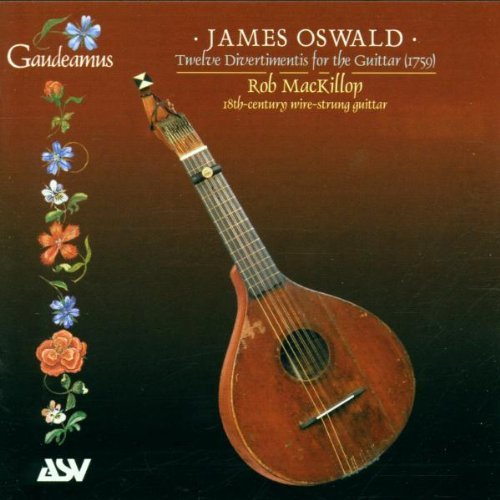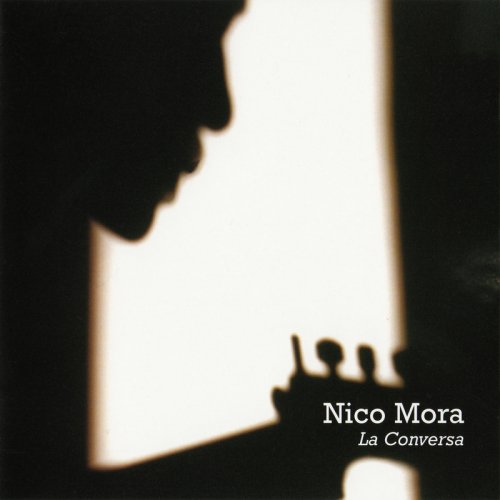Rob MacKillop - Oswald: Twelve Divertimentos for the Guittar (1759) (2001)

Artist: Rob MacKillop
Title: Oswald: Twelve Divertimentos for the Guittar (1759)
Year Of Release: 2001
Label: Gaudeamus
Genre: Classical
Quality: FLAC (image+.cue,log,scans)
Total Time: 59:15
Total Size: 272 Mb
WebSite: Album Preview
Tracklist: Title: Oswald: Twelve Divertimentos for the Guittar (1759)
Year Of Release: 2001
Label: Gaudeamus
Genre: Classical
Quality: FLAC (image+.cue,log,scans)
Total Time: 59:15
Total Size: 272 Mb
WebSite: Album Preview
1. Divertimento 1 Amoroso - Vivace - Gavota 4:10
2. Divertimento 2 Affetuoso - Tempo Di Minuetto - Gavotto 4:40
3. Divertimento 3 Amoroso - Allegro Moderato - Andante 6:04
4. Divertimento 4 Affetuoso - Gavotta - Aria - Con Spirito 4:25
5. Divertimento 5 Cantabile - Allegro Moderato - Pastorali - Tempo Di Minuetto 5:43
6. Divertimento 6 Amoroso - Moderato - Pastorali - Affetuoso 4:52
7. Divertimento 7 Affetuoso - Andante Allegro - Adagio - Tempo Di Minuetto 4:43
8. Divertimento 8 Affetuoso - La Chase - Tempo Di Minuetto 4:09
9. Divertimento 9 Gratioso - Musette Moderato - Andante Con Spirito 4:34
10. Divertimento 10 Amoroso - Allegro Moderato - Andante - Adagio - Giga 4:55
11. Divertimento 11 Andante - Allegro Moderato - Cantabile 5:12
12. Divertimento 12 Largo - Moderato Con Spirito - Amoroso - Giga 5:10
Performers:
Rob MacKillop (guittar)
When reviewing music by a composer that is new to me I make it a policy not to read the inlay notes of the disc so as not to come to any preconceived attitudes regarding the music. So my first impressions of these "Twelve Divertimentis" by James Oswald played by Rob Mackillop on a 18th century wire-strung guitar was that of the composer not having a formal musical education but of a simple but talented minstrel perhaps from Scotland or Ireland who, given the rustic feel of his music, with its dance like movements, was employed to provide the music for local village dances.
As it turned out I was only right about his place of birth as indeed James Oswald was born in Scotland. He came from a poor but musical family and eventually rose to the elevated position of Chamber Composer to King George III of England. The fact that his "Twelve Divertimenti" date from 1759 is remarkable in as much that he seemed to retain an affinity for rural Scottish influences.
Even with their folk-like feeling the "Twelve Divertimenti" are highly structured, each one beginning with a slow section usually an "Amoroso" or an "Affetuoso" and mostly ending with a more lively movement, a "Gavotta" or "Giga". Although these works are not long in duration (the longest being 6 minutes 4 seconds) the variety of themes make them a musical delight.
As might be expected the wire-strung guitar produces a brighter sound than the conventional classical guitar which tends to limit its pallet of timbres, and although Rob Mackillop does discuss the subject of tonal variation in the inlay notes the performance does not abound with them. However his use of dynamics is excellent, the pianissimos are just that and the fortes loud enough without forcing the natural limitations of the instrument.
Rob Mackillop's genuine enthusiasm for this music is apparent, not only from his playing but also from his highly informative inlay notes, which reveal him to be a scholar of the subject. He should be commended for his research into the repertoire of this little known area of the guitar's history. -- Andy Daly
As it turned out I was only right about his place of birth as indeed James Oswald was born in Scotland. He came from a poor but musical family and eventually rose to the elevated position of Chamber Composer to King George III of England. The fact that his "Twelve Divertimenti" date from 1759 is remarkable in as much that he seemed to retain an affinity for rural Scottish influences.
Even with their folk-like feeling the "Twelve Divertimenti" are highly structured, each one beginning with a slow section usually an "Amoroso" or an "Affetuoso" and mostly ending with a more lively movement, a "Gavotta" or "Giga". Although these works are not long in duration (the longest being 6 minutes 4 seconds) the variety of themes make them a musical delight.
As might be expected the wire-strung guitar produces a brighter sound than the conventional classical guitar which tends to limit its pallet of timbres, and although Rob Mackillop does discuss the subject of tonal variation in the inlay notes the performance does not abound with them. However his use of dynamics is excellent, the pianissimos are just that and the fortes loud enough without forcing the natural limitations of the instrument.
Rob Mackillop's genuine enthusiasm for this music is apparent, not only from his playing but also from his highly informative inlay notes, which reveal him to be a scholar of the subject. He should be commended for his research into the repertoire of this little known area of the guitar's history. -- Andy Daly
DOWNLOAD FROM ISRA.CLOUD
James Oswald Twelve Divertimentis for the Guittar Rob MacKillop 01 2001.rar (272.4 MB)
James Oswald Twelve Divertimentis for the Guittar Rob MacKillop 01 2001.rar (272.4 MB)

![Barre Phillips - Three Day Moon (1978/2025) [Hi-Res] Barre Phillips - Three Day Moon (1978/2025) [Hi-Res]](https://www.dibpic.com/uploads/posts/2025-12/1766322384_cover.jpg)
![Reggie Watts - Reggie Sings: Your Favorite Christmas Classics, Volume 2 (2025) [Hi-Res] Reggie Watts - Reggie Sings: Your Favorite Christmas Classics, Volume 2 (2025) [Hi-Res]](https://img.israbox.com/img/2025-12/21/cn1c8l2hi7zp9j05a5u7nw49g.jpg)


![Nana Vasconcelos - Saudades (1980/2025) [Hi-Res] Nana Vasconcelos - Saudades (1980/2025) [Hi-Res]](https://www.dibpic.com/uploads/posts/2025-12/1766056483_cover.jpg)
![Ready Player 3 - Ready Player 3 (2025) [Hi-Res] Ready Player 3 - Ready Player 3 (2025) [Hi-Res]](https://www.dibpic.com/uploads/posts/2025-12/1766128773_cover.jpg)

![Milton Man Gogh - Fully Stretched (2025) [Hi-Res] Milton Man Gogh - Fully Stretched (2025) [Hi-Res]](https://www.dibpic.com/uploads/posts/2025-12/1766080588_cover.jpg)